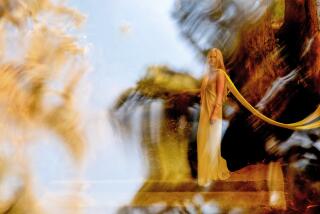The Awe of Seeing : EVENING TRAIN, <i> By Denise Levertov (New Directions: $17.95; 120 pp.)</i>
- Share via
Dignity, reverence and strength are words that spring to mind as one gropes to characterize not only this 21st volume by one of America’s most respected poets but also her writing over the span of a nearly 50-year career.
Levertov’s work has exhibited certain interesting consistencies over time, both in terms of her concerns and her poetics. This is not to say that the work hasn’t changed or grown, but a reader poking her nose into any Levertov book at random finds herself in the presence of a clear, uncluttered voice--a voice committed to acute observation and engagement with the earthly, in all its attendant beauty, mystery, and pain.
If you scan a list of Levertov’s previous book titles, you can get a pretty accurate whiff of her abiding themes: “Here and Now,” “O Taste and See,” “The Freeing of the Dust,” “Life in the Forest,” “Footprints,” “Breathing in Water,” “With Eyes at the Back of Our Heads,” “The Sorrow Dance,” “A Door in the Hive.” These titles point to Levertov’s almost devotional attraction to acts of seeing and hearing. She has always employed her determined, civilized, compassionate mind in a search for the sublime through the worldly.
Quietly marveling at animals, plants, landforms or the elements, sometimes Levertov will even write from the point of view of a river. But whatever the point of view, the poems gently but firmly insist on remaining open questions. Levertov evokes--she doesn’t legislate, demand or try to wring feeling from the reader.
Each poem in “Evening Train” represents a little pocket of well-modulated awe--a contained meditation not just on what’s sensed and felt but also on the human ability to be moved and to perceive at all. Like the locomotive in the book’s title, the poet seems to glide through the world, continually penetrating and passing through often deserted landscapes, temporarily illuminating them, as the sounds of her journey echo--a sustained, occasionally mournful note that hangs in the air.
Levertov’s poems have always been been borne along on a tide of carefully controlled musicality. By this point in her career, she has the ebb and flow of her characteristic sound effects so at her command that the poems convey a kind of serenity in their sound: “the floating dock where gulls cluster,” and “They are as calm / in motion as in repose.” The pacing implied by her line breaks also heightens this effect of smoothness, or deceptive ease, on the surface of the poems.
Divided into eight titled sections, “Evening Train” is one of those collections in which the poems blend together to form one long poem, their borders blurring like the enmisted mountaintops Levertov likes to describe. “Lake Mountain Moon,” the opening section, as its title suggests is quite pastoral. As the book progresses, Levertov works up to grappling with problems of conscience, most notably in the section entitled “Witnessing From Afar.” Later, issues like AIDS, wife-beating, the impending threat of nuclear annihilation, the Gulf War and pollution are the central subjects in the poems. “The Tide,” the book’s first section, contains pieces examining spirituality, both in classically broad philosophical terms and in much more intimate ones.
“Suspended,” the book’s final poem, is an example of Levertov’s personal approach to big religious questions:
I had grasped God’s garment
in the void
but my hand slipped
on the rich silk of it.
The ‘everlasting arms’ my
sister loved to remember
must have upheld my leaden
weight
from falling, even so,
for though I claw at empty
air and feel
nothing, no embrace,
I have not plummeted.
Throughout the book, Levertov seems fascinated by faith. She is also drawn to images representing the void, usually deathless forces in nature that can dwarf but not douse puny human cogitations and yearnings. She seems to like to use images of water birds, which makes sense on a lot of levels, given her proclivity for the elements (water birds have the privileged ability to inhabit three--land, water and air) and her penchant for expressing the continuous influence on human consciousness of the push-pull and possible conflict between earthliness and transcendence.
Levertov possesses a practically perfect instinct for picking the right distance to speak from: how far away to remain from both reader and subject, and how much of an overt role to give herself in the poem. Perhaps this skill could be called Levertov’s control of levels of omniscience in her work, though omniscience seems somehow too male and too removed a word to describe this phenomenon as it manifests itself in her practice. Because of her ability to “position” the voice in the poem so well in relation to both subject matter and reader, the poems, though they are complex, are accessible and readable, whether the narrator doesn’t quite materialize, or is clearly present and active.
“Evening Train,” through the sheer economy of its poems, allows Levertov’s rhythms and sentiments to accumulate in her readers’ minds, leaving them with a kind of hushed, ethereal calm.
More to Read
Sign up for our Book Club newsletter
Get the latest news, events and more from the Los Angeles Times Book Club, and help us get L.A. reading and talking.
You may occasionally receive promotional content from the Los Angeles Times.









